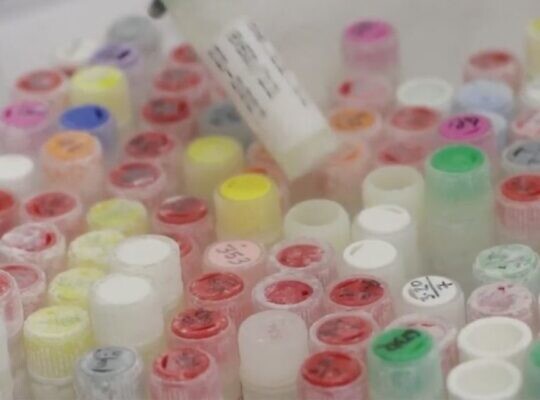After the incident where his father, Abraham, had him bound to an altar in an attempt to sacrifice him to God, Isaac faced another challenge. He and his wife, Rebekah, struggled to conceive children. The King James Bible mentions that “Isaac entreated the Lord for his wife, because she was barren,” and “the Lord was entreated of him, and Rebekah his wife conceived.”
However, a question arises: was Rebekah truly barren? It’s worth noting that Rebekah was likely much younger than Isaac. They didn’t marry until he was 40, and their children weren’t born until Isaac reached an advanced age. Scientific studies have indicated that advanced paternal age can contribute to an increased risk of miscarriages and infertility. Additionally, stress has been shown to affect semen quality, and Isaac certainly went through a traumatic experience on the mountain where his father almost sacrificed him. So, perhaps the Bible’s account might not be entirely accurate, and Isaac’s sperm could have played a role in their difficulties conceiving.
Fast forward to the modern day, and we find Khaled Kteily, a 25-year-old management consultant who experienced an unfortunate accident with scalding tea in 2014. While seeking medical attention for his burns, he began to contemplate his own fertility. The fear of not being able to have children due to an accident troubled him. This experience led him to establish Legacy, a start-up aimed at making sperm testing and storage more accessible.
In 2017, Kteily’s idea became a reality with Legacy’s launch. The company offered a convenient way for men to test and preserve their sperm without the discomfort of visiting a medical clinic. Kteily believed that sperm preservation would become a rite of passage in the future, just as important as other life events.
Around the same time, a groundbreaking study was published. Hagai Levine and Shanna Swan, among other experienced epidemiologists, conducted the largest-ever study of sperm counts. Their research covered 185 previous studies involving 42,935 men from 1973 to 2011. The results were alarming, showing a 59% decrease in sperm counts and a 50% reduction in sperm concentration. These findings sparked concerns and led to a rise in awareness about the potential decline in male fertility.
Spermpocalypse became a popular term to describe the situation, and Legacy began to flourish as men became increasingly concerned about safeguarding their fertility. Kteily incubated his start-up at the Harvard Innovation Lab and accelerated its growth through Y Combinator. By the end of 2022, Legacy had secured contracts with major insurers, substantial funding from renowned venture capital firms, and endorsements from celebrities like Justin Bieber, Orlando Bloom, and the Weeknd.
In this context, the question of male fertility and sperm health has gained public attention. Kteily’s mission to provide a solution for men has become relevant in today’s world. However, Legacy now faces competition from other at-home sperm testing and storage companies, including Dadi, Fellow, Yo, and more. The race to help men preserve their fertility is on, and Legacy’s goal is to remain a leader in the field.
The sperm count debate isn’t merely a matter of scientific research; it has also entered the realm of politics and ideology. As birth rates decline across the developed world, the discussion about fertility has become intertwined with concerns about population growth, masculinity, and the environment. The charged political landscape has led to varying interpretations and reactions to the issue.
The decline in sperm counts has generated concern across a wide spectrum, from environmentalists to cultural warriors who view it as part of a broader crisis in masculinity. While some critics dismiss these concerns as alarmist, others see them as a reflection of the real threat of environmental toxins affecting reproductive health. The debate continues to evolve, with political implications and unexpected alliances.
Khaled Kteily himself, a charismatic figure in the field, represents both the personal and professional dimensions of the sperm preservation movement. He’s a prime example of someone who recognizes the importance of preserving fertility in the modern world while advocating for the destigmatization of discussions around sperm health. The debate over sperm health is a complex and multifaceted issue, and it seems to reflect many aspects of our evolving society and culture.
“The End of Men” encapsulates an anti-modern undercurrent present within what some describe as the new right. Recently, in the New Statesman, right-populist intellectual Sohrab Ahmari coined the term “Unabomber right” to describe Raw Egg and his associates, citing their misguided reaction to valid concerns about the dehumanizing consequences of industrialization. Ahmari pointed out that while Theodore Kaczynski, the Unabomber, resorted to terrorism to disrupt the “power process,” today’s rightists tend to engage in edgy memes and lifestyle escapism, promoting weightlifting and “clean eating” as ways to resist Davos Man. More sympathetically, James Pogue, writing for Vanity Fair, described “The End of Men” and its characters as reacting against forces that have severed our connection to our physicality.
The hosts of the Red Scare podcast also entered the conversation regarding sperm decline, associating these discussions with right-wing nationalists, which contrasts with the historical association with leftist hippies.
In December, shortly after the latest spermpocalypse study was published, Tucker Carlson invited Kteily to appear on his Fox News show. Kteily hesitated because, while it offered a significant platform for discussing sperm health, he was concerned about addressing his product in a way that might alienate potential customers. The transgender market is a crucial part of Legacy’s clientele, and Kteily was worried about how to navigate discussing this while avoiding potential controversies. As the number of male-to-female gender transitions increases, so does the demand for sperm freezing among this group.
Global semen quality is not just a concern for start-ups and right-wing groups; Malcolm and Simone Collins, prominent figures in the tech world, are leading efforts to reverse the decline in birth rates. They have been associated with the tech-accelerationist movement, focusing on moonshot solutions like artificial wombs and in vitro gametogenesis. These approaches differ from the macho lifestyle solutions discussed in “The End of Men.”
Both the Collinses and Raw Egg Nationalist are set to participate in Natal, a pro-procreation conference in Austin. However, their political views differ from “The End of Men” crowd. They identify as more socially tolerant and advocate for tech-based solutions to address birth rate decline.
The concern over declining fertility is not limited to conservatives. Pro-growth centrists like Tyler Cowen and Matt Yglesias are worried about the impact of fertility decline on economic stagnation, while East Asian governments are investing heavily in programs to encourage childbearing. Nevertheless, there is some discomfort on the left regarding the issue.
Start-ups addressing sperm health have often been described in progressive terms. Leslie Schrock, a Brooklyn health-tech investor, emphasizes the importance of discussing sperm health, as it is often overlooked. Legacy has faced challenges advertising sperm-freezing on platforms like TikTok due to societal taboos.
There are ecological concerns associated with sperm decline, with links to pollution and its impact on fertility. Vulnerable populations face challenges like higher rates of miscarriage due to environmental factors, making reproductive choice moot in those circumstances.
Skeptics of sperm decline research argue that it may not be as dire as portrayed. Urologists like Harry Fisch and Paul Turek have different perspectives, with Turek suggesting that sperm trends downward due to decreased competition among men to spread their seed.
Critics argue that sperm counts alone are not a strong predictor of fertility potential, as various factors contribute to birth rate decline, such as individualistic lifestyles, the impact of chemicals, and high costs of child-rearing.
Legacy offers a convenient diagnostic for sperm health, but pursuing assisted reproduction might require additional testing at a clinic, making it less practical for severe cases. The company’s main revenue driver is sperm freezing, with a diverse customer base that includes transgender individuals, people with medical conditions, vasectomy patients, and more.
While the sperm decline issue remains uncertain, it has led to increased interest in men’s fertility. Recent studies, like the one showing higher sperm counts in men who lift heavy objects, have garnered attention, impacting public awareness of this topic.









